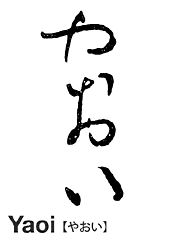
Originally
an acronym for the words yamanashi "no climax," ochinashi
"no punchline," and iminashi "no meaning,"
the term refers to taking existing male characters from anime/manga and
pairing them together in a romantic relationship.
「やまなし」「おちなし」「いみなし」の頭文字から生成された語で、男性キャラクター同士を恋愛的関係に見立てる形式を指す。
. | 


